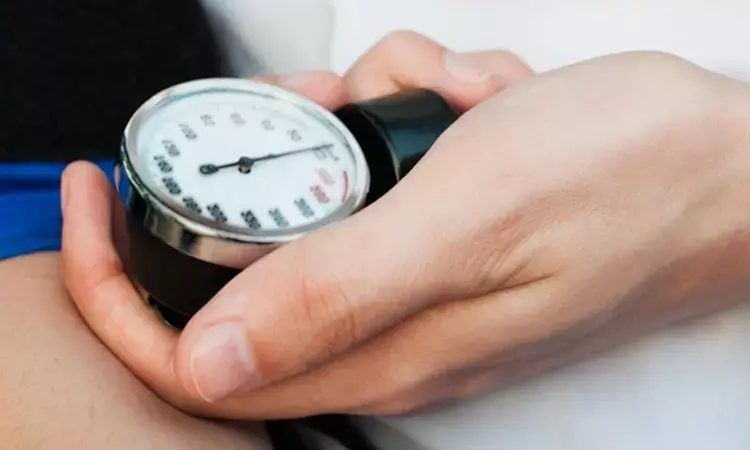- Home
- Medical news & Guidelines
- Anesthesiology
- Cardiology and CTVS
- Critical Care
- Dentistry
- Dermatology
- Diabetes and Endocrinology
- ENT
- Gastroenterology
- Medicine
- Nephrology
- Neurology
- Obstretics-Gynaecology
- Oncology
- Ophthalmology
- Orthopaedics
- Pediatrics-Neonatology
- Psychiatry
- Pulmonology
- Radiology
- Surgery
- Urology
- Laboratory Medicine
- Diet
- Nursing
- Paramedical
- Physiotherapy
- Health news
- Fact Check
- Bone Health Fact Check
- Brain Health Fact Check
- Cancer Related Fact Check
- Child Care Fact Check
- Dental and oral health fact check
- Diabetes and metabolic health fact check
- Diet and Nutrition Fact Check
- Eye and ENT Care Fact Check
- Fitness fact check
- Gut health fact check
- Heart health fact check
- Kidney health fact check
- Medical education fact check
- Men's health fact check
- Respiratory fact check
- Skin and hair care fact check
- Vaccine and Immunization fact check
- Women's health fact check
- AYUSH
- State News
- Andaman and Nicobar Islands
- Andhra Pradesh
- Arunachal Pradesh
- Assam
- Bihar
- Chandigarh
- Chattisgarh
- Dadra and Nagar Haveli
- Daman and Diu
- Delhi
- Goa
- Gujarat
- Haryana
- Himachal Pradesh
- Jammu & Kashmir
- Jharkhand
- Karnataka
- Kerala
- Ladakh
- Lakshadweep
- Madhya Pradesh
- Maharashtra
- Manipur
- Meghalaya
- Mizoram
- Nagaland
- Odisha
- Puducherry
- Punjab
- Rajasthan
- Sikkim
- Tamil Nadu
- Telangana
- Tripura
- Uttar Pradesh
- Uttrakhand
- West Bengal
- Medical Education
- Industry
Women who develop high blood pressure after birth at greater risk of chronic hypertension

Washington, DC - Blood pressure that remains elevated over of time - known as chronic hypertension - has been linked to heart disease, which is the leading cause of death in the United States. Recent research has shown that persistent high blood pressure may also increase the risk for stroke and overall mortality. Yet, only about 1 in 4 adults with chronic hypertension have their condition under control, according to the Centers for Disease Control and Prevention.
In a new study to be presented today at the Society for Maternal-Fetal Medicine's (SMFM) annual meeting, The Pregnancy Meeting™, researchers from the University of Pittsburgh will unveil findings that suggest that women who develop high blood pressure during pregnancy and who continue to have elevated blood pressure postpartum are at an increased risk for developing chronic hypertension.
The study looked at 368 women who had normal blood pressure during pregnancy and followed them for six to 18 months after delivery. For six weeks following childbirth, women took their blood pressure at home using a remote monitoring system connected to their smart phones. A total of 5,958 blood pressure readings were collected.
Results found that at their first postpartum visit, nearly half of the women (49.5 percent or 182) had developed high blood pressure. These women had a slower decline in blood pressure in the first six weeks following delivery and higher blood pressure at their postpartum visit compared to the remaining women (50.5 percent or 186) who did not develop high blood pressure.
"By leveraging data from our widely scaled postpartum hypertension remote monitoring program, we were able to discover that a woman's blood pressure in the first six weeks after childbirth appears to be an important indicator of whether she is likely to develop chronic hypertension six to 18 months later," said one of the study's lead authors, Eesha Dave, MD, a resident physician in obstetrics and gynecology at UPMC Magee-Womens Hospital in Pittsburgh.
"This information helps us to better identify women who may be at risk of developing cardiovascular problems later in life and take preventative steps," said another one of the study's lead authors, Alisse Hauspurg, MD, a maternal-fetal medicine subspecialist and assistant professor at University of Pittsburgh.
Hina Zahid Joined Medical Dialogue in 2017 with a passion to work as a Reporter. She coordinates with various national and international journals and association and covers all the stories related to Medical guidelines, Medical Journals, rare medical surgeries as well as all the updates in the medical field. Email: editorial@medicaldialogues.in. Contact no. 011-43720751
Dr Kamal Kant Kohli-MBBS, DTCD- a chest specialist with more than 30 years of practice and a flair for writing clinical articles, Dr Kamal Kant Kohli joined Medical Dialogues as a Chief Editor of Medical News. Besides writing articles, as an editor, he proofreads and verifies all the medical content published on Medical Dialogues including those coming from journals, studies,medical conferences,guidelines etc. Email: drkohli@medicaldialogues.in. Contact no. 011-43720751


